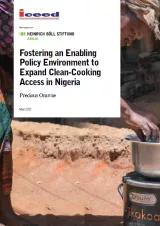Fostering an Enabling Policy Environment to Expand Clean-Cooking Access in Nigeria
Content is no longer being updated
Globally, access to clean cooking remains bleak as over 3 billion people still rely on polluting fuels and technologies for cooking, heating and lighting. Since the adoption of clean cooking does not seem to keep up with population growth rates, the world is not seeing the level of growth in uptake that is required (World Health Organization et al., 2018). Though there is appreciable progress in China and India, with over 450 million people gaining access to clean cooking since 2010 through the interplay of liquefied petroleum gas (LPG) programmes and clean air policies (International Energy Agency [IEA], 2019), the countries of sub-Saharan Africa (SSA), broadly speaking, are still lagging behind.
In developing Asia, 43% of the population relies on biomass for cooking while 80% of the population in SSA still cooks with solid biomass (IEA, 2017). The International Energy Agency (2017) estimates that, under current policy and population trends, 2.3 billion people globally and 60% of the rural population in developing countries will remain without access to clean cooking facilities in 2030. In SSA, over 300 million people will gain access to clean cooking by 2030, an estimated 100 million of them from clean-cooking pledges in countries’ Nationally Determined Contributions (NDCs) to climate actions under the Paris Agreement.
The 2019 African Energy Outlook reports that SSA only had a marginal increase in clean-cooking-technology access – from 15% in 2015 to 17% in 2018 – leaving over 900 million people without access to clean cooking. However, a number of countries in the region are beginning to step up efforts. In Ghana, 24% of the population relied on LPG in 2018, while in Côte d’Ivoire, LPG is now used by almost 55% of urban households. Ethiopia has begun to feel the impact from gains in electricity access, as 32% of urban households were cooking with electricity in 2018 compared with only 6% in 2011. In South Africa, electricity is the main cooking fuel used by more than 80% of households nationally (IEA, 2019).
Many countries have developed ambitious national programmes to tackle the issue of clean cooking. China launched a programme to bring clean-burning biogas stoves to rural families (Sinton et al., 2004). Indonesia’s programme for families that were cooking with kerosene to switch to LPG reached over 40 million homes. In 2009, India announced a National Biomass Cookstove Initiative addressing technology, standards, testing, research and commercial dissemination. Peru and Mexico have set national goals of helping, respectively, 500 000 and 600 000 rural families to adopt clean-cooking solutions (Anenberg et al., 2013). Many other countries are moving in similar directions.
From the above, it is very clear that several countries are making remarkable progress in expanding access to clean cooking. Nigeria too can expand access to clean cooking solutions and reach millions of households if the right policies and institutions are in place, even though 10.5% currently use LPG, while about 70% use inefficient biomass for cooking (National Bureau of Statistics, 2020).
Many of the countries making progress towards clean cooking are poorer than Nigeria. Ethiopia, Ghana, Kenya and India all have per capita GDP lower than Nigeria. This brings to the fore the centrality of policies. The choices that governments make set countries apart in their ability to provide clean cooking for households and other users.
This report reviews Nigeria’s clean-cooking policies, the institutions, current challenges and an overview of international best practices. The report is a result of desktop research and interviews with stakeholders in Nigeria’s clean-cooking space. Prior to data collection, a wide range of national and international stakeholders from key government agencies, the private sector, development partners, academia and civil society organisations, most of whom are partners of the Nigerian Alliance for Clean Cookstoves, as well as representatives of international clean-cooking partnerships, were identified and consulted.
